
ASK
ME

REGISTER
NOW
SUMMARY ACTIVITY
2ST INTERNATIONAL CONFERENCE ON CURRRENT LEGAL ISSUE
AND HUMAN SECURITY (ICLHS)
(ONLINE)
8 December 2022
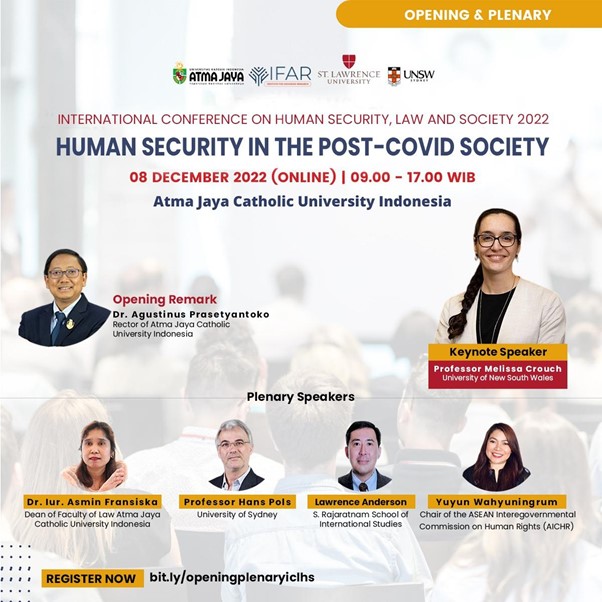
Background
The COVID-19 pandemic has radically changed society in various ways. The impacts brought by the pandemic constitute a broad spectrum of changes ranging from economics and politics to socio-cultural. The public health crisis has disrupted the pillars constituting social practices in society. Further, it introduced a new normal that fundamentally changes social interactions, modes of work, and education services.
Globally, the COVID-19 pandemic has transformed from a public health crisis into a global threat to human security. In this regard, human security has expanded the traditional notion of security from state security to a human-centered understanding of security. This understanding promotes a more comprehensive framework of security which aims to address the root causes of human insecurity and offer a better understanding of multidimensional challenges to human survival and well-being (Caparini, 2021).
Building on this understanding, governments worldwide have carried out measures to mitigate the impact of the pandemic. Lock-down, social distancing measures, and partial or full state of emergency are some efforts to prevent the spread of the virus. Additionally, technology has been the key in shaping the measures, such as the introduction of live surveillance as a part of the attempt to control the spread of the virus. Furthermore, the pandemic has forced many governments to accelerate digitalisation and the adoption of technology in delivering public services. Many countries, particularly those in the Global South, faced challenges in delivering services due to a lack of necessary ICT infrastructures, which hindered the population from having equal access to public services. Moreover, the disparity in knowledge and digital literacy have brought substantial challenges to fully reap the benefits of technological changes.
Those issues have drawn scholars’ attention and have been broadly discussed in numerous scholarly publications. Yet, specific references to the experience of societies who live in the Global South remain understudied. With the scale of changes that affect societies, the 2022 International Conference on Law, Human Security, and Society invites scholars discussing a broad spectrum of human security issues in post-COVID-19 society in the following streams of panels:
The pandemic has impacted different political regimes. In both democracy and authoritarian regimes, the pandemic has strengthened and weakened both types of regime. On the one hand, some democratic governments, such as New Zealand, have enjoyed rising legitimacy for their adept pandemic management, saving the lives of their citizens. However, other autocrats, such as in the Philippines and Hungary, have also exploited the pandemic to expand their power by initiating new restrictive rules and regulations. On the other hand, some democratically elected governments have lost their legitimacy due to their inability to curb the pandemic effects. Donald Trump’s loss in the 2020 Election showed how his incompetence in handling COVID-19 led to his defeat. Some autocrats have also faced a similar fate, undermined by the social and economic effects of the pandemic. For instance, the resistance against strict lockdown due to religious or economic reasons, such as in Iran and Turkey, exposed autocracy's weakness.
Various political effects of the pandemic compel us to reflect and theorize on the impact of the pandemic on current and future modes of governance. Scholars have forecasted that the COVID-19 pandemic will not be the last in our generation. Another global pandemic will strike and shake future democratic and autocratic regimes. Thus, theorizing the ways the pandemic strengthens and cripples regimes, a representation for billions of people, should be important to formulate policy designs that can overcome pandemic effects by considering the political contexts (i.e., regime types) in which the designs are embedded. Furthermore, theorizing the pandemic's political impacts allows us to better understand how non-political factors (i.e., the pandemic) can influence the durability of regimes. This panel welcomes scholarly works that aim to answer, but are not limited to, the following questions:
How does the pandemic reinforces and undermines different types of regimes?
How do different types of regime manage the impacts of the pandemic to gain legitimacy?
How similar and different are the outcomes of the pandemic management for democracy and autocracy?
Panel 2: Datafied Practices, Real-Time Surveillance, and Digital Rights
The pandemic forced many governments to intensify the use of technology in delivering public and social services. To prevent the spread of the virus, the government restricted and controlled peoples’ mobility through various forms of policies, from lockdown to partial or full restriction of people’s mobility. Moreover, the pandemic has led to large-scale real-time surveillance of the population through digital apps. People were forced to shift their activity online, leading to the emerging popularity of platform-based economic activities. In addition, many governments introduced data-intensive policies and practices to deliver public services and social services. The panel invites scholars working in these areas below to submit abstracts:
How do data-intensive regulations shrink civic space and affect human rights protection, such as the right to privacy?
To what extent do digital-based services engender discrimination against vulnerable groups and have created inclusion and exclusion?
How will the problem of misinformation and digital literacy affect the people in the post-pandemic?
Panel 3: Health System and Community Resilience
The COVID-19 pandemic has exposed the fragility of health systems and social and health inequities globally, including in Indonesia. Governments are struggling to provide equitable, appropriate, and balanced strategies in delivering public, social and health services to people, especially those who live at the margin. Additionally, the pandemic brought to light the urgency of a ‘mental health epidemic’ requiring substantial investments to improve the availability of mental health services.
During the pandemic, for instance, we observed intensified technology usage in delivering health and social services or reorientating the state budget for supporting safety-net policies. However, these initiatives do not fully address the impacts of the pandemic at the community level. Many remain struggling and continue to suffer. Dealing with systemic problems such as the COVID-19 pandemic requires structural approaches beyond technocratic interventions. We must reflect critically on how we organise our society and health system, how best we can fulfil our moral obligations to protect the most vulnerable of our community, and how to strengthen health and community systems. This panel invites scholars who are carrying out studies on the following topics:
How has the pandemic affected our health and community systems, and what should be done to strengthen these systems?
To what extent has this pandemic taught us about the government's preparedness in developing strategies to respond to public health emergencies such as the COVID-19 pandemic?
What strategies should governments adopt in response to public health emergencies?
What have been the impacts of the pandemic on health systems and service delivery, including mental health?
How do communities develop social resilience to respond to the pandemic?
Panel 4: Post-Pandemic Environment and Human Security
The COVID-19 pandemic has exposed the linkage between environmental degradation and the potential emergence of future pandemics. Economic development requires a massive amount of natural resources that, in turn, intensively deteriorate the quality of our environment. Environmental degradation unleashes viruses that have never been in contact with humans, making humans vulnerable to new diseases.
However, as the pandemic has receded, economic performances in major powers such as America, China and Russia have reached the same level as before the pandemic. Major powers have extracted more resources to compensate for opportunity costs due to the pandemic, hampering the effort to overcome the climate crisis. The vicious cycle of pandemic and economic growth seems to become the only solution for our world. This panel aims to answer, but is not limited to, the following questions:
How do the ideas of economic development and the pandemic develop and intermingle?
How does the fusion of economic development and pandemic shape the solution to the climate crisis?
Panel 5: Engendering Human Security
COVID-19 Pandemic has affected society at various scales, including at the household level. Many households experience economic turbulence, and family members suffer from personal anxiety due to multi-dimensional factors, including job security and lack of social interaction due to mobility restriction policies. Across different countries, various studies show gender equality has made women more vulnerable to suffering from the COVID-19 pandemic, such as job security or the increase in the number of offline and online gender-based violence. The post-pandemic recovery condition also demonstrates the adverse impact of gender inequalities; the proportion of unpaid care commonly carried out by women has increased the barrier to accessing the job market. With this background, the panel invites scholars working in the areas below:
How does the COVID-19 pandemic aggravate gender equality in the workplace?
How does the COVID-19 pandemic affect women’s security from violence and other forms of discrimination, inclusion and exclusion of women?
To what extent do laws and other government policies in responding to the pandemic affect women?
Panel 6: Human Security and the Politics of International Development
During the pandemic, we have witnessed how major powers like the United States, China, and Russia mobilized and channelled humanitarian aid to almost every corner of the world. Backed by abundant resources and strong scientific infrastructures, they have formulated strategies, garnered resources, and distributed aid to help under-resourced countries, especially those in the Global South. From the human security point of view, their initiatives signal the potential of global cooperation to end world-level problems such as the pandemic.
Although major powers have shown what they can do to help other countries, we have also observed how they have utilized the human security framework to expand their political influence on other countries. As a project, human security is multi-faceted. It is never neutral since human security projects are supported by certain actors with specific interests in a particular time and place. As human security projects are planted in a particular society, they potentially alter the society's institutional landscapes (e.g., political, legal, economic). Thus, to grasp the impact of COVID-19 related human security projects on the institutional landscapes of a country, this panel aims to answer, but is not limited to, the following questions :
How do COVID-19-related international aids shape a country's institutional configurations (e.g., political, legal, economic)?
What are the limits of international COVID-19 aid in shaping the institutional configurations of a country?
What are the opportunities and limitations of the global South countries in negotiating with COVID-19 international aid conditionalities imposed by major powers?
Panel 7: Rule of Law and Access to Justice in Post-Pandemic Context
In many countries, the COVID-19 pandemic has disrupted the work of the justice system. Socially distancing policies and restricting peoples’ mobility have affected how the justice system functions. The court, which normally requires direct interaction of parties in the courtroom, has been forced to adapt new procedures online. The shifting into online systems often has created problems as countries in the Global South do not have adequate infrastructure in place that can equally connect their citizens online. For example, a country like Indonesia, whose internet infrastructures and connections are heavily concentrated in the western part of the country while the rest are remotely connected. Similarly, the attempt to control socially distancing interactions between people has exacerbated the problem of overcrowding in places of detention. In addition, the shift into the online mode of the justice system also faces challenges such as the issue of equal access, privacy, and security. This panel invites scholars who work on the following topics to participate:
How did the pandemic affect the function of the court? How did judicial institutions respond to the condition, and what initiatives have been established in responding to the limitation created by the pandemic?
How did the COVID-19 pandemic affect access to justice, and to what extent did the pandemic worsen the access to justice?
Panel 8: Business law and post-Covid society in Southeast Asian countries
The Covid-19 pandemic continues to disrupt the economy and daily life of people in Indonesia’s Southeast Asia region since 2019 until now, including the business competition climate. Report This effort seeks to map how the Covid-19 pandemic affects competition institution’s business in ASEAN. The responses from each business competition agency were obtained from an online minisurvey conducted by the Business Competition Supervisory Commission, Indonesia in the month of June – July 2021. The survey targets are business competition institutions from 10 ASEAN member countries.
Respondents surveyed stated that they experienced one or more impacts of Government policies from 2020 to the present, such as budget cuts and changes to strategic plans or annual focus on products/industry and work procedures affected by the pandemic. Responding to changes caused by the Covid-19 pandemic and economic recovery, respondents have made some adjustments in their policies or institutions, such as diverting. The pandemic has contributed to the growth of the digital industry, which encourages the Government to adapt, prioritize the digital economy and encourage competition institutions in ASEAN to be more involved in managing the digital industry.
The pandemic has also resulted in increased government concern for MSMEs. To protect MSMEs from the abusive behavior of large companies, most of the competent institutions in ASEAN have proposed.The implementation of advocacy and policy recommendations. Following up on the economic recovery process, strengthening coordination related to the digital industry.
Rundown
|
Schedule Thursday, 8 December 2022 |
|
|
09.00 – 09.10 |
Opening |
|
09.10 – 09.20 |
Opening Remark Dr. Agustinus Prasetyantoko Rector of Atma Jaya Catholic University
Opening Remark II Dr. Iur. Asmin Fransiska Dean of the Faculty of Law Atma Jaya Catholic University |
|
09.30 – 10.30 |
Keynote Speaker: Prof. Melissa Crouch University of New South Wales, Australia
Topic: The rule of law and human security in post-Covid-19 ASEAN |
|
10.30 – 12.00 |
Plenary The rule of
law and human security in post-Covid-19 ASEAN Challenges of
the protection of ESC rights for vulnerable groups and disabilities in post-pandemic
Southeast Asian countries, Dr. Seree Nonthasoot (tbc), Member of
the Committee Economic, Social, and Cultural Rights, the United Nations Economic and Social Council (ECOSOC) Peace and
security in post-Covid-19 Southeast Asian countries, Ambassador Ong Keng
Yong, Executive Deputy Chairman, RSIS, Director of Institute of
Defense and Strategic Studies, Singapore
Human rights and human security in the post-pandemic ASEAN, Yuyun
Wahyuningrum, ASEAN Intergovernmental Commission on Human Rights
Human security and the future of human rights protection in
post-Covid-19, Dr. Iur Asmin Fransiska, Dean of the School of Law ,
Atma Jaya Catholic University, Indonesia |
|
12.00 – 13.00 |
Lunch Break |
|
13.00 – 14.30 |
Parallel panels Panel 1: The future of governance in the post-pandemic Society Host: Irma Hidayana (St Lawrence University, USA) Panel 2: Datafied practices, real-time surveillances and digital
rights Host: Dr. Sinta Dewi Rosadi (UNPAD, Indonesia) Panel 3: Health systems and community resilience Host: Nyoman Sutarsa (Australia National University, Australia), Gaby
Sudewa (IPP Atma Jaya, Jakarta)
Panel 4: Post-pandemic environment and human security Moderator: Aksel Tømte (NHRC, University of Oslo) |
|
14.30 – 15.00 |
Break |
|
15.00 – 16.30 |
Parallel panels Panel 5 : Engendering human security Host: Dr Dyah Pitaloka (Monash University, Malaysia)
Panel 6 : Disaster and pandemic response Host: Dr. Jonathan Lassa (Charles Darwin University, Australia)
Panel 7: Access to justice Faculty of Law, (Atma Jaya Catholic University, Jakarta)
Panel 8: Business law and post-Covid society in Southeast Asian
countries Faculty of Law, (Atma Jaya Catholic University, Jakarta) |
|
16.30 – 17.00 |
Closing Dr. Hilmar Farid, Directorate General of Culture of the Ministry of Education |
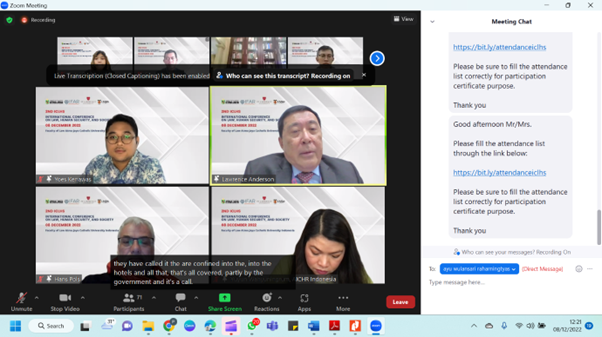 | 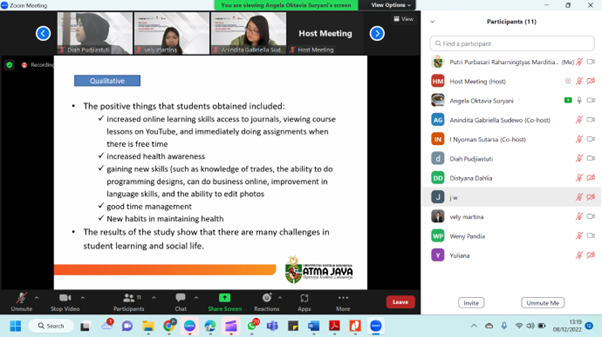 |
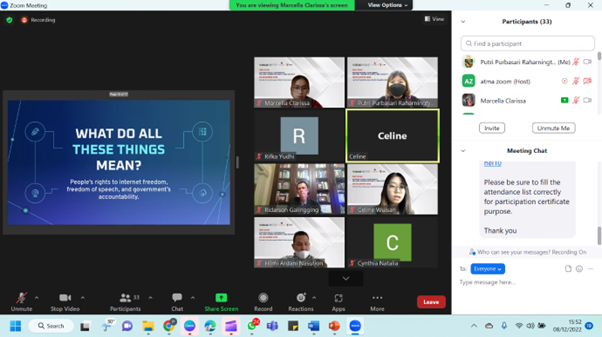 | 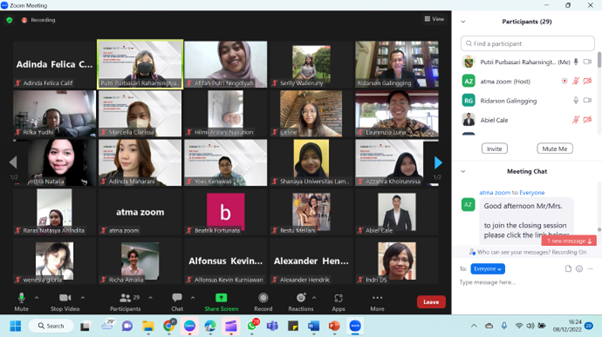
|